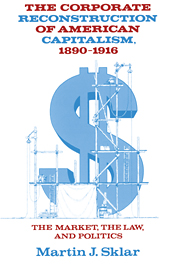Book contents
- Frontmatter
- Contents
- Preface
- List of abbreviations used in the footnotes
- 1 Introduction: Corporate capitalism and corporate liberalism
- Part I The market and the law
- Part II Politics
- 4 The politics of antitrust
- 5 Two progressive presidents
- 6 Woodrow Wilson and the corporate-liberal ascendancy
- 7 Conclusion: Fathers and prophets
- Bibliography
- Index
6 - Woodrow Wilson and the corporate-liberal ascendancy
Published online by Cambridge University Press: 06 July 2010
- Frontmatter
- Contents
- Preface
- List of abbreviations used in the footnotes
- 1 Introduction: Corporate capitalism and corporate liberalism
- Part I The market and the law
- Part II Politics
- 4 The politics of antitrust
- 5 Two progressive presidents
- 6 Woodrow Wilson and the corporate-liberal ascendancy
- 7 Conclusion: Fathers and prophets
- Bibliography
- Index
Summary
Introduction
On 23 May 1912, before a group of banqueting capitalists and civic notables, Woodrow Wilson, governor of New Jersey and presidential aspirant, anticipating misconceptions among members of his audience about his position on economic matters and the government-society relation, introduced his address on the relation of government to business with the complaint, “Most persons are so thoroughly uninformed as to my opinions that I have concluded that the only things they have not read are my speeches.”
Wilson's chagrin may well have been justified. Not only were some of the less informed capitalists and conservatives belaboring under frightening notions of Wilson as a near-populist, an unreliable vote-chaser, or an irresponsible trust-buster, but probably even greater numbers within, or leading, the ranks of Bryan–type Democrats and insurgent Republican progressives pictured the presidential candidate in terms of their own wishful interpolations rather than facts. For many of these, it would lead inevitably to disillusionment with, and bitter hostility toward, Wilson the president – a hostility not altogether fair because directed against a Wilson of their hopes and dreams, not a Wilson of reality; yet, in afterthought, not altogether unfair, because as is characteristic of politics in the United States, as perhaps elsewhere, Wilson the candidate, while refusing responsibility for such hopes and dreams, found therein powerful propulsion for his rise to the presidency and did not undertake decisively and publicly to disavow them. From historical perspective, it may be said that in a time of conflict between an ascending corporate capitalism and a receding competitive capitalism, Wilson, although a political leader in transacting the ascendancy of the one, appealed to partisans of both.
- Type
- Chapter
- Information
- The Corporate Reconstruction of American Capitalism, 1890–1916The Market, the Law, and Politics, pp. 383 - 430Publisher: Cambridge University PressPrint publication year: 1988
- 1
- Cited by

